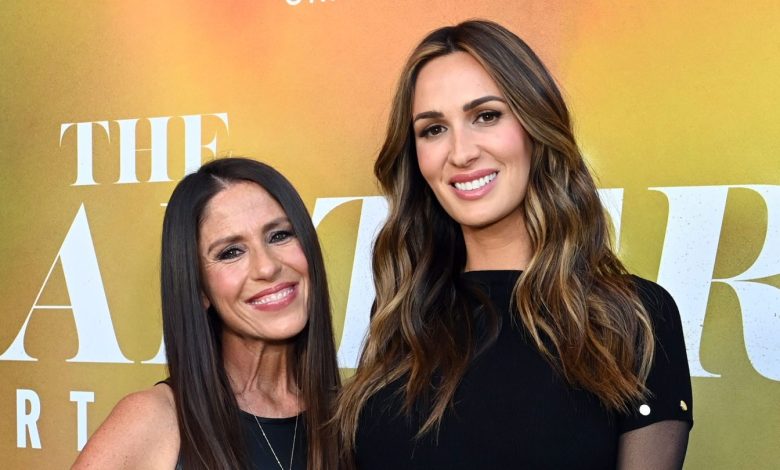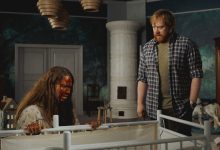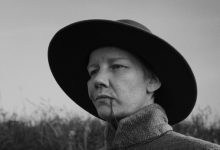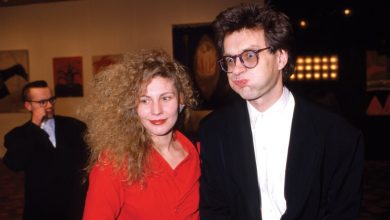‘The Carters’ Director on Her Bond With Angel and Addiction Stigma: “She Knew That Aaron, in His Healthiest State, Would Want to Help Others”

Soleil Moon Frye, director of The Carters: Hurts to Love You, hopes others will see a piece of themselves in the Carter family story.
That was her mission, she tells The Hollywood Reporter when setting out to make the film on the family’s battle with mental health and addiction issues.
اRelated Posts:
Frye’s task was also, she says, to help Angel, twin sister of the late Aaron Carter, share her truth after losing three siblings to addiction. Aaron passed from an accidental drowning after taking drugs in November 2022; Leslie and Bobbie Jean (B.J.) from drug overdoses, as well, in 2012 and 2023.
The Paramount+ documentary, streaming Apr. 15, utilizes a wealth of archival footage from home videos and tapes of siblings Nick, Aaron, Leslie, Bobbie Jean and Angel to offer up an intimate glimpse into how the Carter’s dealt with global fame. The two-part doc tracks Nick’s Backstreet Boys stardom, Aaron and Leslie’s solo careers and their relationships with parents Jane and Robert Gene.
“The family’s story was so tragic, and there was so much pain. And yet through that pain, it was so clear to me that that Angel was really finding her purpose,” Frye says of connecting with Angel. “That purpose was taking that heartache and pain and finding light.”
Below, Frye — perhaps best known to audiences for her performances in Punky Brewster and Sabrina the Teenage Witch — speaks to THR about her own personal story when it comes to addiction, why making this film proved a cathartic experience for Angel, and setting out to honor the hopes and wishes of Aaron and B.J.: “I feel that Angel really knew that Aaron, in his healthiest state, would have wanted to have the opportunity to help others… And before B.J. passed away, she said: ‘Please make sure that our story is told.’”
I’m so intrigued as to how this all started for you.
I met the incredible Angel, and I was so inspired by her courage, grace and brave heart as someone who has been on this incredible journey in life with loved ones struggling with mental health and addiction. It was incredibly close to my heart, and the family’s story was so tragic, and there was so much pain, and yet through that pain, it was so clear to me that Angel was really finding her purpose. That purpose was taking that heartache and pain and finding light.
Over the last few years [I’ve had] this feeling, this moral responsibility to want to create a safe space for Angel so she can have the opportunity to share her story. At the same time, as we watch the archival [footage] and hear their stories, there’s so much that is so universal about this. We’re facing a crisis globally, and there’s never been a more important time to talk about mental health and addiction. I really hope that people watching it will connect to it and relate it to their own families and lives and realize that we have to have these meaningful conversations. It’s time to de-stigmatize all of these assumptions that we have to be able to better understand each other and have more empathy and compassion.
Why has it never been a more important time?
For so many years, we haven’t had open dialogues around struggles. There has been so much stigma around mental health or voicing our pain, our struggles, and we see it globally. I watch Aaron’s journey and I remember meeting him as a young boy when we worked together, and he was just the most vivacious, beautiful, bubbly spirit. And we watch throughout this journey, how pain and and loss and the roller coaster of life can take us on so many different paths. And when we don’t feel like we can share, we can feel very isolated and alone.
When I watch this, I see millions and millions of people through the lens of this family, and with social media becoming what it’s been, I don’t even think we’ve begun to scratch the surface of what that means for young people and teenagers and children growing up. We witness it through the bullying of this young man who was just in so much pain. I absolutely feel as though addiction has to be looked at as the disease that I believe it is. When somebody is inflicted with a disease, we gather around and support them. A dear friend of mine who lost their son said, “When it comes to addiction, oftentimes, people run the other way because they don’t know how to deal with it.” It’s incredibly important that we start these conversations early in childhood.
How long have you been a friend of the Carter family?
I met Aaron who was working on this show when he was just a teenager. He was so sweet. Then, I was fortunate to get a call to meet Angel — this was a few years ago. The moment that I met her, I was blown away by her courage and strength. And as we got to know each other, we gained this trust. I went over to her home one day and she had stacks of videotapes that she had never watched, photo albums… I was so fortunate that she trusted this archive with me. I’m so drawn to archival [research] and how so much of the backbone of these human stories speaks to us through being able to witness childhood. So that began this journey, and the more trust that was built, the more the family opened up.
We get such an intimate glimpse into the Carters and their childhood. What do you think fans of Aaron and Nick will learn about the family that surprises them?
We live in a society where it is very easy to make assumptions and judgments around people. I really hope that in watching this, they will find some piece of themselves through it and that it will create meaningful conversations around how we look at mental health and addiction. As someone who grew up in this incredible, colorful world, I was so fortunate to have so much of my childhood, and I have amazing friends that have flourished and grown up to do exquisite things in their careers and their lives and their families. And then… there were so many of my loved ones that I lost so young that had grown up with me. So I hope it also sheds a light into this world that I think we may think we have an understanding of, but it will give us a deeper layer of empathy and compassion.
In watching the archival footage and watching Nick at the piano, his practices, wanting to be so stoic and perform at his optimal and watching Aaron rehearse… I’m watching the [footage] and hours are going by in rehearsal. I thought of so many of my favorite musicians and artists and actors and athletes — you hear so much about the breaking points. But what leads to that breaking point? What does that pressure look like? And when you [combine] mental health and fame and addiction and that weight of the world, of wanting to be a people pleaser, what does that look like? … I want to be an instrument for something far larger than myself.
We’ve seen a few documentaries in recent years — I think of Child Star with Demi Lovato and Quiet on Set — about child fame, stardom and how damaging that can be. The Carters were dealing with so much more, too, but was this a subject that you also wanted to spotlight?
It was so important for me to allow the archival to speak for itself, to allow Angel to share her truth, because it’s so important to be able to drown out the noise. Do you know what I mean? I am someone who has grown up to have incredible friends… [But] there has also been so much loss of deep, beautiful friendships, of some of my dearest friends that grew up with me that didn’t make it out. Some of us made it out and made it through it, and some of us didn’t. So I feel as though that is always going to strike a chord for me because I was able to experience it through my own friends and loved ones in the business and outside of the business.
Why was now the right time for Angel to share her truth?
Angel was always the one behind the stage. She never wanted to be the one in front. With the loss of her siblings, and during the course of this documentary, she lost her third sibling [B.J.] to addiction and mental health. So, out of the five siblings that she grew up with, she lost her three siblings and her father. And I feel that she really knew that Aaron, in his healthiest state, would have wanted to have the opportunity to help others and B.J. and Leslie. And before B.J. passed away, she said: “Please make sure that our story is told.” So I think she, too, felt a responsibility to take this pain and turn it into purpose and to take this trauma and turn it into light. So that the Conrad and Carter children, the next generation, would not have to carry on that generational trauma. They could break this pattern so that her daughter could live a different life. So [Angel’s] family story would be able to help others. That’s what so much of her mission has been.
Do you think this documentary has helped Angel in finding some closure?
In some sense, it’s been incredibly moving for me to hear how cathartic it has been for her and her family. And that is, and will always be, one of the great privileges of my lifetime. To be able to witness the healing. To see Nick and the family, to see Prince last night, Aaron’s son, and his beautiful light shining. It’s like, oh, I feel like [Angel] is moving through this with this deeper strength.
Is this subject something you’d like to pursue further with your documentary filmmaking?
Absolutely. One of the things that connected Angel and I so much was that I had experienced loss with friends and loved ones that had faced the same struggles. I’ve been making [another] documentary that deals with love and family and addiction. And when I first met Angel, I think she quickly realized that I wasn’t going to come to this project with judgment. One of the closest people in my life through childhood — the person who this documentary that I made is on — he died in June as we were in the process of making [The Carters: Hurts to Love You]. And Angel was by my side throughout it. She lost her third sibling, and I lost one of the best friends in my life. Had I not had the experience … I don’t know that I would have had the courage or the empathy to understand addiction in the way that I did. It touches so many lives.
I am so sorry for your loss. That is just gut-wrenching. Hopefully, this is a life-long friendship for you and Angel now.
Thank you. And I have to say, to have been able to have the incredible support system and exquisite team that we had on this… [EPs] Susan Zirinsky, James [Goldston] and Steven [Baker] and Terry [Wrong] and Paramount+, Candle Media… I keep thinking I’m in a dream. I am so thankful that I get to dream it with each and every one of them because growing up, I always loved journalism and I always loved documenting. To be able to create with the most inspiring journalists that I grew up with, it’s just been such a profound experience. Because from the very beginning, I said, “If you let me share a story around breaking generational patterns of mental health and addiction, told through the courage of Angel and this family story, I am all in.” They supported me, and that has been a true gift.
The Carters: Hurts to Love You is streaming on Paramount+ April 15.
Source: Hollywoodreporter
HiCelebNews online magazine publishes interesting content every day in the TV section of the entertainment category. Follow us to read the latest news.
Related Posts
- Lil Nas X Hospitalized After He “Lost Control of the Right Side” of His Face
- Victoria Beckham’s huge milestone she may reach before husband David
- ‘Untold’ Trailer Brings Gilbert Arenas and Javaris Crittenton NBA Beef to Netflix
- Nicky Katt, ‘Dazed and Confused’ and ‘Boston Public’ Actor, Dies at 54
- Aaron Carter’s Family Hoped Dancing with the Stars Casting Would ‘Change His Life’ as His Addiction Struggles Continued





